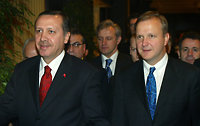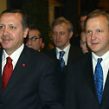
European Election Results Rekindle Turkish Reform Agenda
Publication: Eurasia Daily Monitor Volume: 6 Issue: 111
By:

Voter apathy within the E.U. during the European parliamentary elections on June 4 resulted in only 40 percent of Europeans’ voting. The election witnessed conservatives and center-right parties winning a decisive victory within most European countries. Britain, Germany, France, Italy, Spain, Poland, Holland, Austria, Hungary, and even the predominantly liberal Finland were among the countries where center-right parties became dominant within the European parliament.
The direct impact of the E.U. parliamentary election is that a majority of conservative Europe opposes Turkey being granted membership to the European Union. Thus, the election has reduced the number of parliamentarians supporting Turkey’s membership aspirations. Therefore, Turkish political observers believe that the country has suffered a major setback (Hurriyet, June 9).
However, some political actors within Turkey and the E.U. consider that the election will not significantly damage Turkey’s membership plans. For instance, the European Commissioner for Enlargement Olli Rehn, said that two thirds of the parties in the parliament support Turkey’s future membership. Thus, the recent election might not undermine this process. "The E.U. should keep its promises and Turkey must continue to implement democratic reforms. Those reforms must involve providing basic rights; including freedom of speech, addressing the Kurdish question, and strengthening religious rights," he explained (NTV, June 8).
Prime Minister Recep Tayyip Erdogan also said that the changes within the E.U. parliament will not rule out Turkey’s future membership. "In relation to the membership process, both Turkey and the E.U. do not examine what people say, instead we consider what action they take," noted Erdogan (www.trt.net.tr, June 9). The Turkish Foreign Minister Ahmet Davutoglu, believes that Turkey-E.U. relations cannot be altered to reflect fluctuations within the E.U. parliament. "No matter who is elected, we should continue to maintain our position, which is determined by documents signed in the past," he affirmed (Anadolu Ajansi, June 8).
Both Erdogan and Rehn said that during the election campaign Turkey was one of the main issues. Many people in Europe associate the fear of illegal migrant workers in their own countries with Turkey’s future membership. Thus, the parties who campaign against its membership use this fear to oppose Turkish membership (NTV, June 8; www.trt.net.tr, June 9).
Political observers assert that voting patterns in the E.U. parliamentary elections are determined by domestic issues, and often result in registering protest votes. European leaders are well aware of this phenomenon. One liberal parliamentarian within the E.U. parliament in Brussels told Turkish journalists that while the election results might present some challenges for Turkey’s membership plans, the key is to understand the stance adopted by the prime ministers of its member countries (Milliyet, June 9). Turkish political experts on the E.U. also share similar views, and emphasize that the European parliament has limited impact on the relationship between Turkey and the European Union. They also suggest that this will not influence any decisions on the issue taken by the leaders of European countries (Anadolu Ajansi, June 9).
The new debate in Turkey is focused on what direction the country should pursue and whether the ruling AKP government will respond proactively. One Turkish journalist recently invited to Brussels reinforced this point: Ankara must now take the initiative. Turkey needs to rejuvenate the drive toward further reform of its political system in the areas of democracy, civil-military relations, establishing a balance on the secularism-democracy issue, and finding a solution to the Cyprus problem (Milliyet, June 9).
More specifically, E.U. officials again reminded Turkey to prioritize the following key areas: amend article 301 in the Turkish penal law, grant more freedom to the media, improve religious tolerance, reform the laws on political parties and on workers unions, and open its ports to Greek Cypriot shipping (Milliyet, June 10).
Interestingly, the Turkish press reported that one of the major issues for the E.U. and Turkey is how to resolve the Cyprus issue. Turkey does not recognize Greek Cyprus as a state while the E.U. has accepted the Greek side of the island into the European Union. Turkish ports remain closed to Greek Cypriot shipping and the E.U. considers this to be a major obstacle to achieving progress, since Ankara does not recognize one of its member countries.
Nonetheless, Brussels has signaled a potentially new approach to dealing with this issue. According to this proposal, if Turkey reopens the Halki Seminary, which was the main theological school of the Eastern Orthodox Church’s Ecumenical Patriarchate of Constantinople until its closure by the Turkish authorities in 1971, and allows the leader of the Orthodox Church in Istanbul to function as its Ecumenical Patriarchate, it might convince European leaders to lift their objections (Sabah, June 10).
Both the Turkish and European authorities believe that these elections will not prove to be a setback for Turkey’s membership plans. However, one major reason underlying European opposition to Turkish accession relates to how the debate is influenced and shaped within the E.U. parliament. Any Turkish or European leader, supporting its membership ambitions, needs to place the country at the center of the political debate within Europe.




